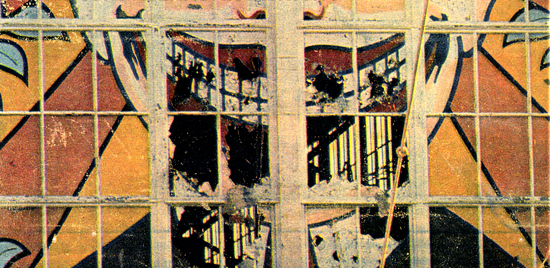THIS: Second Time Around
By:
March 27, 2017

The good old days keep getting more recent, yet stay behind us, just out of reach. We all have our personalized nostalgia, times cherished by us that are usually concurrent with a carefree childhood or a teenage heyday, and are inconsequential or baffling to others who lived through those same times as just a baby or already an adult.
Comicbook superheroes’ origins are always fixed at about 15 years before the present, moving up along with readers or viewers who are just joining them. Time, the forward rush of fashion, the neglect of childish things and the transience of household technology seem to give the same yellowed, grainy, ancient, thrift-store discarded-family-photos-pile look to everyone’s record of their kid years and their older relatives, no matter if the pic was snapped in 1890 or 1990. It’s as if retrospect is a backward, inward glance that blurs our recollection and somehow warps and lengthens the span of time between our beginnings and our now, physically antiquing the older artifacts and keeping them in a perpetual tarnished long-ago as if by some spacetime surface-tension.
Surely our means of saving the past are becoming more ephemeral with our haste to innovate and replace; a polaroid can hold up better than an inkjet print, as if the newer, disintegrating imagery is getting blasted off mementos of the present as we fast-forward to the next possessions, the next receding views.

On the other hand, nothing ever stays dead; not historic photos, or franchised fictions, or abandoned ideologies, preserved in the ambient amber of the internet, scavenged from any past we need to be comforted by or profit from. Fred Trump was one of those fallen angels blasting his way back into the past; at one point he held an outdoor party where the entertainment was hurling bricks through the glass house of a classic Coney Island pavilion that many born long after would come to see as the miracle monument of a good-old-days they had never lived the first time; Trump would then clear the land and bury the dreams more decisively.
His son, who later attempted to similarly wipe clean the slate of democracy, came of age just in time for the era of America’s greatest self-satisfaction. That Eisenhower, Kennedy, Mad Men, Rat Pack period of crowning achievement and closed social circles. We could topple the towers of another day’s dreams because we would always be making more, though also, things would always be the same. It was the least self-questioning time in America’s history — more than that, the question could not even be formulated, because the flood of enforced goodwill made discontent inconceivable. (We didn’t ask questions in the Reagan era either, but by then we knew what we weren’t talking about.)

“We,” of course, is a relative term; those years did see the natal roiling of the Civil Rights movement, rock ’n’ roll and other dissents, but the white, the male, the moneyed, still had enough strength and numbers to relegate the rest of the country to a “them.” The bellowing, boorish bonhomie of Trump, perceiving none of the viciousness in his merry dismissal of anyone either not in agreement or apparently in his way, most reminds me of the latter-day stage persona of Frank Sinatra, last icon of that era before youth and newness became the object of reverence instead.
Mad Men gave a new generation an advanced study in how suffocating that old-boy America was, how shaky its pillars stood; greatest-generation nostalgia and context-less YouTube clips or hipster-clothing-store mixtapes of Frank and Dino and Sammy give us the fashion-statement without the subtext. Trump is the first public figure since Frank to project that swagger, that unquestionable confidence, that self-declared stature, and that disregard of anyone who doesn’t automatically hold similar status. He was born into a triumphal, postwar America; we had just won the world, and Trump’s only frame of reference is victory. There’s a top, and there’s everything beneath it; if you just got here (by age or nationality), if you’re not in his image (possessed of any melanin or no penis), if you don’t already have the same stuff (advantage, affluence), you’re a loser by definition, not by any conscious malice of his.

When you’re born into what looks like utopia, in the same way as when you inherit a parent’s fortune, you feel there should be nothing to winning, because you’ve won before you start. Postmodern revival of a Rat Pack aesthetic, of course, adopts the stylishness and leaves the misogyny and brutality behind; Trump’s anachronistic chairman-and-CEO persona is the toxic supremacy without the style or talent. Some yesterdays are so vivid that they never leave you; it’s only dangerous when there’s a bygone day you never left.
Images: Smashed smile, Coney Island Steeplechase Park; Fred Trump’s “Demolition Party”; the Rat Pack trinity; Donald Trump with Mob-associated business-partners he’s never met, Tevfik Arif and Felix Sater
MORE POSTS by ADAM McGOVERN: OFF-TOPIC (2019–2025 monthly) | textshow (2018 quarterly) | PANEL ZERO (comics-related Q&As, 2018 monthly) | THIS: (2016–2017 weekly) | PEOPLE YOU MEET IN HELL, a 5-part series about characters in McGovern’s and Paolo Leandri’s comic Nightworld | Two IDORU JONES comics by McGovern and Paolo Leandri | BOWIEOLOGY: Celebrating 50 years of Bowie | ODD ABSURDUM: How Felix invented the 21st century self | CROM YOUR ENTHUSIASM: C.L. Moore’s JIREL OF JOIRY stories | KERN YOUR ENTHUSIASM: Data 70 | HERC YOUR ENTHUSIASM: “Freedom” | KIRK YOUR ENTHUSIASM: Captain Camelot | KIRB YOUR ENTHUSIASM: Full Fathom Five | A 5-part series on Jack Kirby’s Fourth World mythos | Reviews of Annie Nocenti’s comics Katana, Catwoman, Klarion, and Green Arrow | The curated series FANCHILD | To see all of Adam’s posts, including HiLo Hero items on Lilli Carré, Judy Garland, Wally Wood, and others: CLICK HERE
